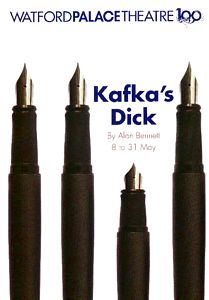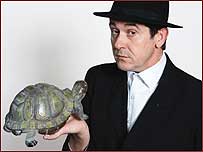KAFKA'S DICK by Alan
Bennett
Venue: Watford Palace 2008
Director: Sarah Esdaile
Venue: Watford Palace 2008
Director: Sarah Esdaile

| The current popularity of Alan Bennett's
work continues with a new production of Kafka's
Dick at the Watford Palace Theatre.
Kafka appears in the present day bemused by his
posthumous success - especially as he wanted
his works burned when he died. |
|
| Cast | |
| Franz Kafka |
Adrian Lukis |
| Max Brod |
Benedict Sandiford |
| Sydney | Bruce Alexander |
| Linda | Victoria Carling |
| Father | Ian Lindsay |
| Hermann Kafka |
Paul Clayton |

Adrian Lukis as Franz Kafka
Reviews
BBC Beds Herts &
Bucks: Ian Pearce
Kafka's Dick gives pleasure in Watford!
Kafka's Dick gives pleasure in Watford!
Alan Bennett has a fascination with Franz Kafka which led him to write two plays about the Czech writer. Kafka's Dick first appeared at the Royal Court Theatre in 1986 and this is a brand new production for the Watford Palace in the theatre's centenary year. To try explain the story is a complex task and is probably best summed up as "Kafkaesque". The play opens with Kafka asking his friend, the grotesquely disabled Max Brod, to destroy his works at his death. Brod didn't destroy them, he published them instead and also wrote Kafka's biography. The scene shifts to the future when a "healed " Brod urinates on the tortoise belonging to Kafka enthusiast Sydney and his wife Linda. Linda dries the tortoise and feels compelled to kiss it at which point it metamorphoses into Kafka. The play then focuses on Kafka's success and the relationship with his father who also turns up in the future. Herman Kafka's name has been tarnished by the success of his son, promoted through Brod's publishing, and his portrayal in the biography. Herman wants to demonstrate that there was a love between father and son but there isn't.
Don't be put off by the strangeness of the plot. Nor should you be wary of not having read Kafka. However a read of the programme notes by Bennett himself will help you enjoy some of the more subtle observations. For example Kafka has a fascination with the way Linda crosses her legs. Ordinary things fascinate him. The juxtaposition between Sydney and Kafka is interesting. Both work in insurance and both hate their names. Kafka shortened his to "K" whilst Sydney is worried at the threat of being reduced to "Sid".
The laughs come relentlessly ranging from pure slapstick to clever literary cross referencing. It has a consistently excellent cast Adrian Lukis captures Kafka brilliantly and I thought Victoria Carling was delicious as Linda, a woman in a loveless marriage who is fascinated by Kafka, the man who is the main reason that her marriage is barren. Ian Lindsay is excellent as Sydney's father. He's rehearsing his questions for the assessors to see if he should go into care. When he's asked questions about Kafka he has the line of the play. "If you're going to ask questions about Czech novelists, we'll all end up in care". [The reviewer fails to mention the outstanding performance of Bruce Alexander as Sydney with fine support from Paul Clayton as Hermann Kafka and Benedict Sandiford as Brod].
There are a couple of problems I have with the play. When we see Brod and Kafka in their real existence Brod talks specifically about the rise of Hitler. Although Kafka's "The Trial" predicts the rise of Nazism, Brod's use of specific dates and events in the future is a hint of the "time travelling" to come. I also found the short scene where Brod and Kafka go to heaven was not needed. It contains some great jokes, for example the Virgin Mary never getting over not having grandchildren. It ends the play on a high which the youngish audience enjoyed but I felt it added nothing.
Overall though, this is a very funny production. As so often at the Palace, the performances fit the lovely theatre like a glove. You can hear every nuance of Bennett's writing and every joke hits the spot. I suspect quite a few of the audience will now pick up The Trial if only to see what the fuss is about.
* *
* * *
Hemel Hemptead
Gazette: Abena Bailey
Play's a laugh a minute
Play's a laugh a minute
Baffling surreal and very funny, Kafka's Dick is a layer cake of relationships that have come together for no apparent reason. Purely Kafkaesque. There's a recognisable cast: Adrian Lukis as Franz Kafka; Victoria Carling as Linda; Ian Lindsay as father; Paul Clayton as Herman Kafka; Bruce Alexander as Sydney and Benedict Sandiford as Max Brod, who put on a seamless performance. Lukis plays a wonderfully melodramatic Kafka, with a whiney voice and childlike gait, who declares to his best friend Max, that he wants all his works burnt when he dies. Lukis and Sandiford as the 'artiste' and 'put-upon friend' have perfect comic timing in this scene and start the play off with a good laugh.
The story goes that Max, instead of burning Kafka's work, publishes it and in his death, Kafka becomes one of the greatest European writers of the 20th century and Max becomes his famous best friend and biographer. The audience is then plunged into the surreality when the action cuts to the future to Linda and Sydney's home, where they are waiting for social services to come and assess father and maybe put him in a home. Sydney, a Kafka fanatic, is ecstatic when Max Brod turns up at their front door (even though he's supposed to be dead) and then later their pet tortoise turns into Kafka. The present day and ghosts of the past merge into this crazy exchange of dialogue founded on the cracks in their relationships. Throughout all this, a very confused father, who has been practising the name of the Prime Minister and day of the week for his social services inspection, becomes increasingly baffled by the goings-on. There are jokes for all tastes - from the intellectual to good old toilet humour - a laugh-a-minute.